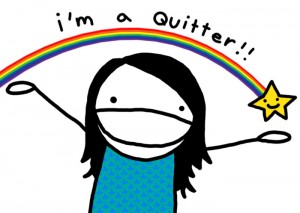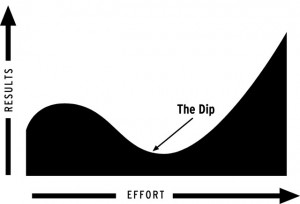It’s that time of year again, when all of us start thinking about the upcoming NEW YEAR and begin the process of identifying our New Years Resolutions. I have some ideas for you that are not the typical mainstream resolutions like losing weight, eating healthier, making more money, getting more clients, spending more time with your loved ones, etc.
No, my ideas involve a strategy that most people don’t think about very often; at least not as a “strategy” and that is:
QUITTING!
Hear me out as this is very important to your New Years Success…
Every new project, hobby, or goal always begins with a lot of enthusiasm and excitement. Then, as time goes on, it gets harder and harder and, of course, less and less fun. When the harder increases the fun decreases on your project or goal, you seriously start to question yourself as to whether or not it’s worth the hassle to press forward.
 The Secret to Massive Success is “Quitting“! That’s right, you heard me, quitting is the key to success. Winners quit fast, quit often and quit without guilt.
The Secret to Massive Success is “Quitting“! That’s right, you heard me, quitting is the key to success. Winners quit fast, quit often and quit without guilt.
One of my mentors, Jack Welch, of GE understood this concept very well and his adage was: “If we can’t be #1 or #2 in an industry, we must get out.”
Now, why did Jack feel so strongly about this. Simple, he realized early in his career that if a project (product, idea, division) can’t be #1 or #2, then it’s time to quit that project because it is essentially sucking resources, capital, focus, time, and energy from the rest of the company. Jack freed the resources from dead-end projects so they could be used in other areas where they could be #1 or #2.
Believe it or not, quitting is a great strategy to manage your life, your career, your goals, and even your relationships. The key, however, is to know what to quit and what NOT to quit. So here are a few tips from my favorite author, Seth Godin, in his book, “The Dip: A Little Book that Teaches You When to Quit (And When to Stick):
- Understand the Dip exists in every project or goal you start. The Dip is the long slog between starting and mastery. The Dip is the long stretch between beginner’s luck and real accomplishment. For example, the difference between an amateur tennis player and a pro isn’t inborn talent — it’s the ability to push through the moments where it’s just easier to QUIT (those periods are known as the dip). You see, the Dip creates “scarcity” and scarcity creates value. The Dip is your secret to success, because the bigger and deeper the dip is, the more success you will have. For example, becoming at attorney isn’t easy; 8 years of education and of course sitting for and then passing the dreaded bar exam. The dip is steep and there is an innate barrier between those who try and those who succeed. The bigger the dip (big barrier), the more success you will have and most likely the more money you will make. If becoming an attorney were easy, everyone would do it, right? Now, let’s look at the opposite. Something with a small dip. Getting a job at McDonald’s as a cashier. Small dip. Just about everyone could do this job with a little training. That’s why the pay is low because there are no barriers. When making important decisions in your life, think about how long and big the dip is. When it comes to making money and earning a living, the bigger the dip, the more money you will make.
- Do not be a Serial Quitter. A serial quitter starts many things and quits when the “going gets tough” and accomplishes very little. You’re better off sticking with one project/goal and working through the dip than you are starting multiple projects/goals and quitting when things get hard.
- Know when you’re in the “Dip”. Simply being aware that you’re in the middle of the dip is the key to getting through it. As soon as you find yourself wanting to “quit”, you’re probably in the deep part of the dip. Quitting when you hit the dip is a bad idea. It’s human nature to quit when it hurts, but that doesn’t make it a good idea.
- The Real Success goes to those who Obsess. It’s true that we’ve been taught we should diversify, but diversification usually doesn’t lead to “mastery”. It’ leads to mediocre. A woodpecker can tap 20 times on a thousand trees and get nowhere or he can tap 20,000 times on one tree and get dinner. Which one sounds better to you? So when considering a new project or goal, think about what would happen if you got through the dip. If it’s worth getting to the other side, then you should “stick” and not “quit.”
- Strategic Quitting is the Key to Success. Of course, you shouldn’t start a project or goal that you don’t believe you can make it through the dip. You’re better off not starting in the first place and cutting your losses. It’s easy to get all excited about learning a new sport, but it’s quite another to stick with it when it gets increasingly difficult. So have the foresight to think about what projects or goals you are starting in the first place. Once, however, you do start a project and realize you can’t be #1 or #2, then you want to strategically quit that project because if you don’t it’s going to suck your time, money, energy and resources from something else you could be #1 or #2 at. Remember what I said earlier: “Winners quit fast, quit often and quit without guilt.”
- Quit at the right time. Unfortunately, most people don’t have the guts to quit. Sometimes, when faced with the Dip, instead of quitting, we get mediocre. Bad idea. To be a superstar, you must do something exceptional. Average is for losers and you deserve better than average.
- Identify the Long-Term Benefits. When you start a project or goal, begin by identifying the long-term benefits of getting through the dip. If you skip this step, then when the short-term pain comes…and it will…you’ll have that natural reflex to want to quit. Don’t.
- Quit if you’re on a dead-end path. I quit the legal field in 1999 because I realized it was a dead-end for me. I kept doing the same thing and wasn’t getting anywhere. Working in a 9-5 job is very limiting because you are not leveraging your time. So if you find yourself on a dead-end path, then quit. Especially if the reward at the end of the dip isn’t worth it or if you simply don’t have the time, passion or resources for it. Quit.
- Don’t Cope. Coping sometimes sounds like a good idea when we’re in a situation we don’t want to be in, so we muddle through it. Don’t cope, quit. Coping wastes your time and keeps you from missing other opportunities you could be excelling at.
Case Study of a Quitter: Michael Crichton
 Crichton was one of the most popular writers in the world, he has sold over 200 million books. You probably know a few of his books such as “Jurassic Park“, “State of Fear“, and “The Andromeda Strain.” His books have been translated into thirty-eight languages and thirteen have been made into films.
Crichton was one of the most popular writers in the world, he has sold over 200 million books. You probably know a few of his books such as “Jurassic Park“, “State of Fear“, and “The Andromeda Strain.” His books have been translated into thirty-eight languages and thirteen have been made into films.
However, at one point Michael Crichton acted very courageously when he “quit” the medical field. You see, Crichton quit when he was on his way to a career at the top of his profession. When he gave up medicine, he had already graduated from Harvard Medical School and done a postdoctoral fellowship study at the Salk Institute for Biological Studies. He gave all of that up and became an author instead. The bottom line was Crichton really didn’t have the stomach for cutting people open so he quit. Even though he did make it through the dip (where a lot of others quit in), he realized when he got to the other side that he didn’t want to spend the rest of his life doing something he didn’t enjoy because of his pride and ego.
- If Michael can quit, so can you.
- What do you need to quit now, so you can focus your efforts elsewhere?
- What shouldn’t you even start in the upcoming New Year?
- When you do start something, as long as it’s not a dead-end, don’t quit. Especially when you’re in the Dip.







